Imagine driving down a highway, the wind whipping through your hair as the scenery blurs by. Suddenly, you veer off course, and your heart lurches as your car careens towards the edge of the road. But then, a sturdy steel barrier appears, stopping your vehicle and preventing a potentially disastrous accident. This unsung hero of road safety is the highway guardrail, and the machine that crafts these life-saving structures is the highway guardrail machine.
Components of Highway Guardrail Machine
The highway guardrail machine is a complex piece of equipment, but its core components can be broken down into:
- Uncoiler: This unwinds large coils of steel sheet metal, feeding it into the processing line.
- Leveling Unit: Ensures the sheet metal is perfectly flat and free of any bends or warps, crucial for creating uniform guardrails.
- Feeding System: Precisely meters the sheet metal into the machine at a controlled speed.
- Punching Unit: Creates holes in the sheet metal for bolting the guardrails together and attaching them to posts.
- Roll Forming Unit: Shapes the sheet metal into the characteristic wavy profile of a highway guardrail using a series of precisely contoured rollers.
- Cutting Unit: Cuts the formed guardrail to the desired length.
- Hydraulic System: Provides the power needed to operate the various machine functions.
- Control System: The brain of the operation, using a PLC (Programmable Logic Controller) to automate the entire process and ensure consistent, high-quality production.
Industrial Applications of Highway Guardrail Machine
Highway guardrail machines are vital for a variety of industrial applications beyond just roadside safety. Here are some key examples:
- Road and Bridge Construction: Guardrails are essential for protecting workers and equipment during construction, as well as channeling traffic and defining safe work zones.
- Traffic Management: Guardrails are used to separate opposing lanes of traffic, prevent vehicles from entering restricted areas, and guide drivers through construction zones.
- Pedestrian Safety: Guardrails protect pedestrians from straying vehicles, particularly near busy roads and highways.
- Industrial Facilities: Guardrails are used within industrial facilities to segregate hazardous areas, protect equipment, and prevent accidents.
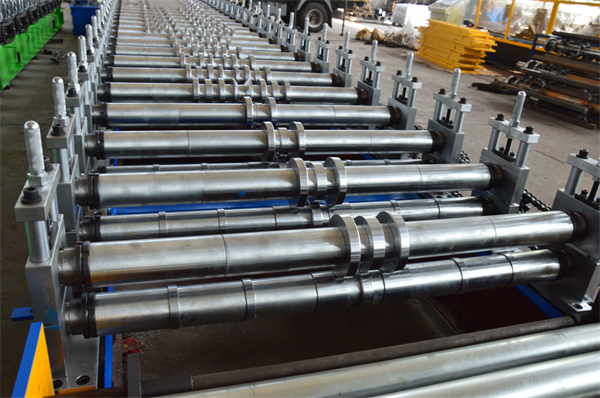
Different Types of Highway Guardrail Machines
The specific type of highway guardrail machine used depends on the production requirements and the desired guardrail profile. Here’s a breakdown of two common types:
- Single-roll forming machines: These are more basic and affordable options, suitable for producing standard guardrail profiles at lower volumes.
- Multi-roll forming machines: Offer greater flexibility, allowing for the production of complex guardrail profiles with varying shapes and thicknesses. They are typically used for high-volume production or when specialized guardrails are required.
Factors to Consider When Choosing a Highway Guardrail Machine
Selecting the right highway guardrail machine involves several key considerations:
- Production Capacity: Consider the volume of guardrails you need to produce per day, week, or month.
- Guardrail Profile: Choose a machine that can produce the specific guardrail profile required for your application.
- Material Compatibility: Ensure the machine is compatible with the type of steel sheet metal you plan to use.
- Automation Level: Decide on the desired level of automation, from semi-automatic to fully automated.
- Budget: Highway guardrail machines are significant investments, so it’s crucial to factor in the initial purchase price, installation costs, and ongoing maintenance expenses.
-
 Weld pipe roll forming machine
Weld pipe roll forming machine -
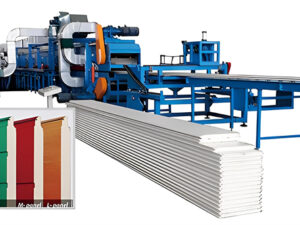 Garage door panel roll forming machine
Garage door panel roll forming machine -
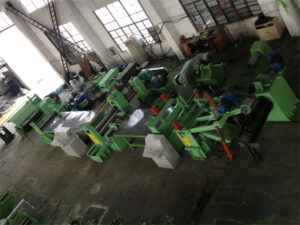 Cut To Length Line
Cut To Length Line -
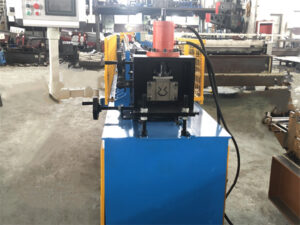 V Strut Roll Forming Machine
V Strut Roll Forming Machine -
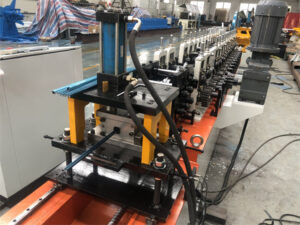 Stainless U Channel for Glass Window Supporter Machine
Stainless U Channel for Glass Window Supporter Machine -
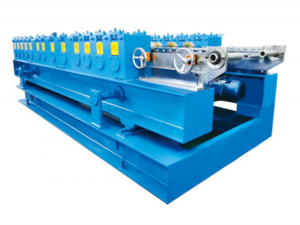 Shutters Box Series Forming Machines
Shutters Box Series Forming Machines -
 Awning Tube Roll forming machine
Awning Tube Roll forming machine -
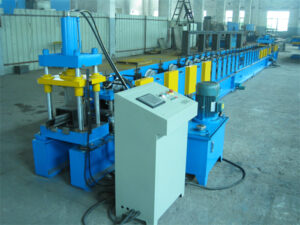 Metal door frame roll forming machine Double rebate
Metal door frame roll forming machine Double rebate -
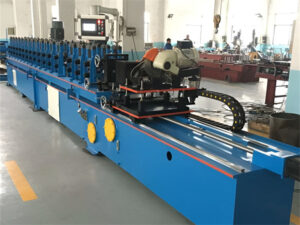 Shutter door octagonal pipe roll forming machine
Shutter door octagonal pipe roll forming machine
Benefits of Using a Highway Guardrail Machine
Investing in a highway guardrail machine offers several advantages:
- Increased Efficiency: Automates the guardrail production process, significantly reducing labor costs and production time compared to manual methods.
- Enhanced Consistency: Ensures consistent guardrail quality in terms of dimensions, profile, and strength, crucial for meeting safety standards.
- Improved Safety: Allows for the production of high-quality guardrails that effectively absorb impact and protect motorists in the event of an accident.
- Greater Flexibility: Some machines offer the ability to produce various guardrail profiles, catering to diverse application needs.
- Potential for Return on Investment: By producing guardrails in-house, companies can potentially save costs compared to relying on external suppliers.
Additional Considerations for Highway Guardrail Machines
Beyond the core components, factors like safety features, maintenance requirements, and after-sales support are crucial when choosing a highway guardrail machine.
- Safety Features: Look for machines equipped with safety features like emergency stop buttons, light curtains, and proper guarding to protect operators from potential hazards.
- Maintenance Requirements: Consider the ease of maintenance, the availability of spare parts, and the manufacturer’s support services to ensure smooth operation and minimize downtime.
- After-Sales Support: Reliable after-sales support from the manufacturer is essential for troubleshooting any issues, receiving technical assistance, and ensuring the machine’s long-term performance.
The Future of Highway Guardrail Machines
The future of highway guardrail machines is likely to see advancements in several areas:
- Increased Automation: Expect continued development of fully automated machines, further reducing human intervention and improving production efficiency.
- Smart Manufacturing Integration: Integration with Industry 4.0 technologies like Internet of Things (IoT) and data analytics could enable real-time monitoring, predictive maintenance, and remote control capabilities.
- Sustainable Materials: Growing focus on sustainability might lead to the development of machines compatible with recycled or eco-friendly steel materials.
- Advanced Guardrail Profiles: Innovation in guardrail design could lead to the need for machines capable of producing more complex and sophisticated profiles for enhanced safety and functionality.
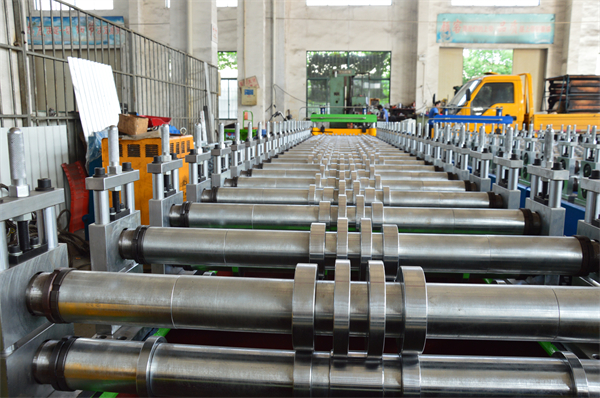
Conclusion
Highway guardrail machines play a vital role in ensuring road safety and supporting various industrial applications. Understanding their components, applications, and key considerations empowers individuals and businesses to make informed decisions when investing in this essential equipment. As the industry continues to evolve, we can expect even more advanced and efficient highway guardrail machines to emerge, shaping the future of road safety and infrastructure development.
FAQ
What is the typical price range of a highway guardrail machine?
The price of a highway guardrail machine can vary widely depending on factors like its type, capacity, level of automation, and brand. Generally, expect a range of USD 50,000 to USD 200,000 or more.
What are highway guardrail machines?
Highway guardrail machines are specialized machines used to manufacture or repair guardrails for roads and highways. There are two main types:
- Roll forming machines: These machines take long sheets of metal and bend them into the specific shape of a guardrail using a series of rollers.
- Repairing machines: These machines are used to fix damaged guardrails caused by accidents or other factors. They typically use a combination of rolling and leveling processes to restore the guardrail to its original shape.
How do roll forming machines work?
The metal sheet is fed through a series of rollers that progressively bend it into the desired profile. The rollers are precisely designed to create the exact shape of the guardrail, ensuring consistency and quality.
What are the benefits of using highway guardrail machines?
- Efficiency: These machines can produce large quantities of guardrails quickly and efficiently, compared to manual methods.
- Accuracy: The rollers ensure consistent and precise shaping of the guardrails, meeting the required specifications.
- Reduced waste: The machines are designed to minimize scrap material, making them an environmentally friendly option.
- Cost-effectiveness: Although there’s an initial investment cost, the efficiency and reduced waste can lead to long-term cost savings.
What are some factors to consider when choosing a highway guardrail machine?
- Production capacity: Consider the volume of guardrails you need to produce.
- Type of guardrail: Different machines may be suitable for different guardrail profiles.
- Level of automation: Choose a level of automation that suits your needs and budget.
- Reputation and warranty: Opt for a reputable manufacturer with a good warranty.
